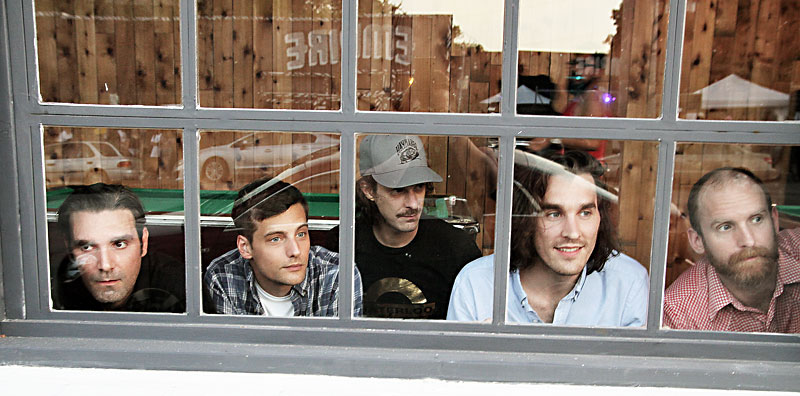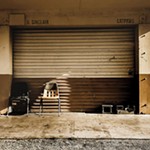Get Out of the City
A. Sinclair makes its mark
By Libby Webster, Fri., July 15, 2016

Sadie's face is covered in gravy, the wreckage of poutine splayed on the table in front of her baking in the midday sun. At 15 months, she's remarkably patient working the press circuit. She watches her father, Aaron Sinclair, with enormous blue eyes, wriggling in his lap every now and then.
Four members of his band, A. Sinclair, sit on Haymaker's patio, the newest addition, guitarist Simon McDonald, absent. Thirty minutes past the appointed hour, the locals are finally assembled. Second of three guitarists, last straggler Michael Booher shrugs off his tardiness with easy charm and a penchant for Tito's and Red Bull cocktails. The frontman, also an axe wielder, regales the table about his daughter's newfound ability to climb out of her crib.
"Sign her up for father-daughter gymnastics classes," cracks bassist Brendan Bond, taking another sip of his Imperial beer.
Fleetingly, Sinclair pretends to entertain the idea. Like most parents, he's dumbfounded by how fast this whole "kid growing up" thing is moving. Time, conceptually and practically, might be Sinclair's biggest concern.
The theme surfaces repeatedly, both in conversation – wishing for more time to practice, more time to tour, getting out albums faster – and on May's masterful Get Out of the City. A genre-bending high of storytelling that fluctuates between folksy Americana and aggressive rock & roll tinged by Nineties influences, A. Sinclair's first full-length and debut on carefully curated L.A. indie Dangerbird Records took more than a year to record.
Producer Danny Reisch's touring schedule played the biggest role in the LP's timeline, but the Austinite's touch proved as crucial as the ensuing time for reflection to the end-result. Painstaking thoughtfulness informs the finished product. Given the dismal attention span granted new music in 2016, that might not mean much, except Get Out of the City motors toward "breakthrough" with the same ambition of a teenager picking up a guitar for the first time – a real feat given the longevity of Sinclair's career thus far.
A group of Texans, all Houston natives aside from Austinite Bond, A. Sinclair is clear about two points: They're not the Boston-to-Austin transplants most press paints them as, and they don't want to rehash Frank Smith, Sinclair's project while living back East after graduating from Berklee College of Music. Frank Smith continued in Austin, where both Bond and drummer Jud Johnson played in the band, but they ditched the moniker several years ago once its rootsier rock began ceding ground to the bandleader's musical evolution. Today, A. Sinclair bears little resemblance to its bygone predecessor.
"Let It Go," the second-to-last track on Get Out of the City, starts blaring in the bar. The single mounts a jumble of noisy guitar atop a pummeling drum line as it attempts to untangle the harsher aspects of life that get embedded in people. All under two minutes.
"God, tell him to shut this shit off," exclaims Bond, looking around for Haymaker's owner, a friend of the band and the sort of everyday hero who later quietly foots A. Sinclair's food and drinks tab.
Meanwhile, Sadie grows restless. While her parent switches from talking about music to attending his tot, the remaining band members consider the singer's songwriting. All composers in their own right, there's an easy brotherhood in the way they talk about each other. Bond tries nailing down the "Aaron-isms" that make the band's music what it is.
"A lot of 'Fuckin' let it rip,' but adhering to the particulars," offers Booher.
"It's his weirdo compulsion to be constantly writing new songs," says Bond, looking over at Sinclair. "Before this record came out, while we were working on it."
His voice drops lower, a bravado intended to imitate Sinclair that sounds nothing like him.
"He says, 'I got something new!'"
"Like 12:30am – at the end of rehearsal," interjects Johnson, also distorting his voice: "'If y'all want, I've got this riff I've been working on.'"
"That's the nature of his artistry," finishes Bond. "He's constantly writing."
Except not really. Over margaritas the next day, nestled in the corner at Güero's before Sinclair clocks in for a shift of waiting tables at another South Congress restaurant, he says he hasn't written anything new in the last couple of months. In his younger days, a dry spell of any length used to freak him out, but not now. Now he knows to just ride it out and wait.
"I'll play music forever, no matter what," he states in his direct, even-keeled way, shrugging. "I made that decision when I was 23: 'If I'm 40 and I'm still playing at local bars, am I gonna be cool with that? 'Cause if I'm not, I should probably figure out what else I'm gonna do.'"
Sinclair's 39.
Güero's increases its volume, people getting wasted at happy hour, while Sinclair wonders aloud exactly what "success" for a musician means anymore. He wants to get to a more comfortable place making music. Get Out of the City spins a four-star effort (revisit "Texas Platters," June 10), but that doesn't mean the band will get it back in money, sales, or sold-out shows. That's how far a great LP can't get you these days.
Sonically, Get Out of the City is hard to place. The year before he left for college, Drive Like Jehu's Yank Crime flipped music for Sinclair. Parts of its distorted guitar lines surface on Get Out of the City via tracks like "Liars in the State of New York" and "You Got a Heart," skuzz in a cleaner context. Other cuts ("I'm on an Ocean," "They Breed and Say Hello") recall the aesthetic of Sebadoh's 1994 Bakesale in terms of darkness paired with rollicking guitar licks. Overall, the album balances folk ("Everything We Need") and country (harmonica-driven "Green Leaves") with rock.
"I like bands like Sebadoh and Pavement," admits Sinclair. "Those bands that sound like they're about to fall apart at any time, you know? I love that aesthetic. I don't feel like I've ever been able to pull that off.
"I think it just comes back down to the song. If one of them ends up being on an acoustic guitar, that's awesome, and if there's a shit-ton of feedback and distortion on it, then that's cool, too."
By Sinclair's own admission, he's inspired by disappointment and regret, a theme he's always explored in his music. The idea of cleaning up his lifestyle for impending fatherhood cuts through a lot of Get Out of the City, inward-facing and self-critical. The desire of wanting to escape the Austin bubble and grow as musicians also unfolds in Sinclair's lyrics, and the spot-on sequencing merges both threads seamlessly. Opening with the slow-burning title track, a hollered, impassioned refrain desperate for escape, the LP ends on a quiet, wistful sigh.
That latter track, closer "Magic in Chapel Hill," the acoustic and pedal-steel-lined foil to earlier tour tale "Liars in the State of New York," goes meditative, singer-songwriter, and ultimately underlines the fact that so much of the new disc feels like aging. When Sinclair sings "We all see things we don't believe" the second time around, the palpable excitement and energy of the previous iteration are gone, replaced instead by a sparse exhaustion. How easy it is to power through sleepless nights, crashing on floors, and going weeks without showering when you're a kid, compared against 39.
For all the album's thematic darkness, however, Aaron Sinclair earnestly repeats how he feels lucky to be doing what he's doing in Austin, surrounded by and pushed by countless other local acts, and with the newfound support of the Dangerbird label. Get Out of the City feels like an opportunity for the band to obtain success. Whatever that is.
"If you're not playing music, it's never gonna happen, so the question becomes, 'How long can I do this for?'"
A. Sinclair closes out its current East/South tour on Tuesday, July 26, at Hotel Vegas, 1502 E. Sixth.










